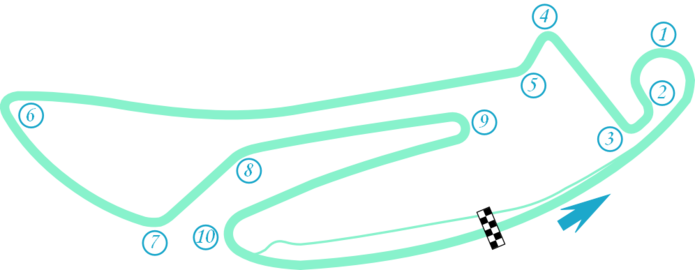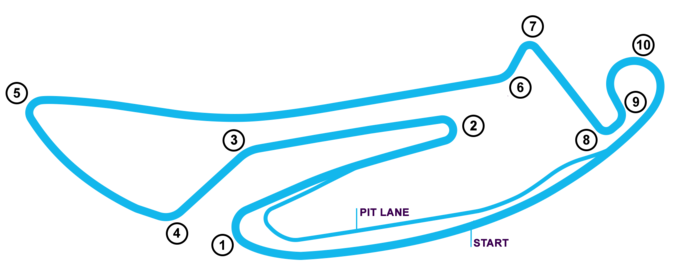Tempelhof Airport Street Circuit
 Configuration for normal anti-clockwise layout (from 2017)
| |
| Location | Berlin, Germany |
|---|---|
| Time zone | CET |
| Coordinates | 52°28′25″N 13°24′06″E / 52.47361°N 13.40167°ECoordinates: 52°28′25″N 13°24′06″E / 52.47361°N 13.40167°E |
| FIA Grade | 3E (3 layouts) |
| Opened | 2015 |
| Major events | Formula E Berlin ePrix (2015, 2017–present) |
| Formula E Circuit (2017-present) | |
| Length | 2.355 km (1.463 mi) |
| Turns | 10 |
| Race lap record | 1:08.350 ( |
| Reverse Formula E Circuit (2020-present) | |
| Length | 2.355 km (1.463 mi) |
| Turns | 10 |
| Race lap record | 1:08.305 ( |
| Extended Formula E Circuit (2020) | |
| Length | 2.505 km (1.557 mi) |
| Turns | 16 |
| Race lap record | 1:17.232 ( |
| Original Formula E Circuit (2015) | |
| Length | 2.469 km (1.534 mi) |
| Turns | 17 |
| Race lap record | 1:24.435 ( |
| Website | www |
The Tempelhof Airport Street Circuit is a street circuit located at the former Berlin Tempelhof Airport in Germany. It is home to the Formula E Berlin ePrix. It hosted its first race as round 8 of the 2014–15 Formula E season. After not holding a race in 2016, the venue was used again with an updated layout for the 2016–17 season.[1]
History[]
Development[]

The 2.469 km (1.534 mi) anti-clockwise track features 17 turns and was designed by Rodrigo Nunes.[2] Venturi driver Nick Heidfeld described the circuit as follows: "It looks like it’s going to be a very twisty and challenging circuit with 17 turns in under 2.5 km, and I think the fans are going to have great visibility wherever they are. Many corners are just followed by the next which also partly shows that overtaking will not be easy, on the other hand, with so many corners followed by each other it’s easier to mess up and make a small mistake and then maybe the driver behind can capitalise on this. The two longer straights will be best for overtaking and using the FanBoost. It will be crucial to get into a good rhythm to get plenty of laps in and to learn the track quickly. It will also be interesting to see how the circuit is built up as normally on a street circuit there is no run-off so and no room for mistakes but in Berlin it could be more open allowing a little more margin for error."[2] The course runs under the canopy roof of the historic Tempelhof Airport terminal from turn 13 to turn 14 and then again during turn 17.
2015 Berlin ePrix[]
The circuit first took place on 23 May 2015. It was initially won by Lucas di Grassi. However, a technical infringement discovered in post-race checks led to his disqualification, with the win being awarded to Dragon Racing driver Jérôme d'Ambrosio.
Temporary absence[]
Owing to the Tempelhof airport building's usage as a temporary refugee shelter, the Berlin ePrix was moved to the Berlin Street Circuit, a layout created specifically for Formula E along the Karl-Marx-Allee to the west of Alexanderplatz.[3] The 2016-17 season calendar listed Berlin as a host city, but did not specify which circuit was to be used. In January 2017, it was confirmed that the race would return to Tempelhof.[1]
2017 Berlin ePrix[]
The circuit hosted the 2017 Berlin ePrix, which became a doubleheader round after the cancellation of the Brussels ePrix, which took place on the 10 and 11 June. The two races were won by Mahindra driver Felix Rosenqvist, his first in the series, and Renault-e.Dams driver Sébastien Buemi.
2020 Berlin ePrix[]
After the 2019-20 season was temporarily suspended and several rounds were cancelled due to the ongoing COVID-19 pandemic,[4] the FIA announced that the season would conclude in early August with three double-header events in Tempelhof, using a different configuration of the circuit for each event. The first two races were held on August 5 and 6, 2020, on a reverse configuration of the track.[5] The next two races took place on August 8 and 9, with the normal circuit being used. The third and final double header was held on August 12 and 13, on an extended version of the track featuring several more turns.
Track Layouts[]

The layout used for the inaugural event in 2015.

The layout used from 2017.

The reverse layout used in 2020-2021.

The extended layout used in 2020.
Track Records[]
For race lap records set during the Berlin ePrix by circuit layout:
| Layout | Driver | Distance | Time | Vehicle |
|---|---|---|---|---|
| 2015 | 2.469 km (1.534 mi) | 1:24.435 | Spark-Renault SRT 01E | |
| 2017 | 2.250 km (1.398 mi) | 1:09.519 | Spark-Venturi VM200-FE-02 | |
| 2018 - 2019 | 2.375 km (1.476 mi) | 1:09.375 | Spark-Audi e-Tron FE05 | |
| 2020 (races 1–2) | 2.335 km (1.451 mi) | 1:08.635 | Spark-Mercedes-Benz EQ Silver Arrow 01 | |
| 2020 (races 3–4) | 2.335 km (1.451 mi) | 1:08.350 | Spark-Jaguar I-Type 4 | |
| 2020 (races 5–6) | 2.505 km (1.557 mi) | 1:17.232 | Spark-Audi e-Tron FE06 | |
| 2021 (race 1) | 2.335 km (1.451 mi) | 1:08.908 | Spark-Audi e-Tron FE07 | |
| 2021 (race 2) | 2.335 km (1.451 mi) | 1:08.305 | Spark-Audi e-Tron FE07 |
The official fastest race lap records at the Tempelhof Airport Street Circuit are listed as:
| Category | Time | Driver | Vehicle | Event | Circuit Map |
|---|---|---|---|---|---|
| Formula E Circuit: 2.355 km (2017–present) | |||||
| Formula E | 1:08.350 | Mitch Evans | Jaguar I-Type 4 | 2020 Berlin ePrix | 
|
| Jaguar I-Pace eTrophy | 1:24.551 | Jaguar I-Pace eTrophy (racecar) | 2020 4th Berlin Jaguar I-Pace eTrophy round | ||
| Reverse Formula E Circuit: 2.355 km (2020–present) | |||||
| Formula E | 1:08.305 | Lucas di Grassi | Audi e-tron FE07 | 2021 Berlin ePrix | 
|
| Jaguar I-Pace eTrophy | 1:24.367 | Oliver Webb | Jaguar I-Pace eTrophy (racecar) | 2020 2nd Berlin Jaguar I-Pace eTrophy round | |
| Extended Formula E Circuit: 2.505 km (2020) | |||||
| Formula E | 1:17.232 | Lucas di Grassi | Audi e-tron FE06 | 2020 Berlin ePrix | 
|
| Jaguar I-Pace eTrophy | 1:35.107 | Simon Evans | Jaguar I-Pace eTrophy (racecar) | 2020 7th Berlin Jaguar I-Pace eTrophy round | |
| Original Formula E Circuit: 2.469 km (2015) | |||||
| Formula E | 1:24.435 | Nelson Piquet Jr | Spark-Renault SRT_01E | 2015 Berlin ePrix | 
|
For qualifying lap records by circuit layout:
| Layout | Driver | Distance | Time | Vehicle |
|---|---|---|---|---|
| 2015 | 2.469 km (1.534 mi) | 1:21.547 | Spark-Renault SRT 01E | |
| 2017 | 2.277 km (1.415 mi) | 1:08.208 | Spark-Mahindra M3ELECTRO | |
| 2018 - 2019 | 2.375 km (1.476 mi) | 1:07.295 | Spark-Nissan IM01 | |
| 2020 (races 1–2) | 2.335 km (1.451 mi) | 1:06.442 | Spark-DS E-TENSE FE20 | |
| 2020 (races 3–4) | 2.335 km (1.451 mi) | 1:06.107 | Spark-DS E-TENSE FE20 | |
| 2020 (races 5–6) | 2.505 km (1.557 mi) | 1:15.468 | Spark-Mercedes-Benz EQ Silver Arrow 01 | |
| 2021 (race 1) | 2.335 km (1.451 mi) | 1:06.227 | Spark-DS E-TENSE FE21 | |
| 2021 (race 2) | 2.335 km (1.451 mi) | 1:06.794 | Spark-Mercedes-Benz EQ Silver Arrow 02 |
References[]
- ^ a b "Formula E's Berlin round returning to Tempelhof Airport". autosport.com. 2017-02-10. Retrieved 2017-12-06.
- ^ a b "Berlin Circuit". fiaformulae.com. Retrieved 2015-07-13.
- ^ "Formula E finds alternative to Berlin refugee shelter venue". bbc.co.uk. 2016-02-15. Retrieved 2017-12-06.
- ^ "Formula E and FIA take decision to temporarily suspend season". FIA Formula E. Retrieved 2020-08-03.
- ^ "FIA Formula E returns to racing with six races in a row in Berlin". Federation Internationale de l'Automobile. 2020-06-17. Retrieved 2020-08-03.
- Motorsport venues in Berlin
- Formula E circuits
- Sports venues in Berlin
- Berlin ePrix
- Motorsport in Berlin



